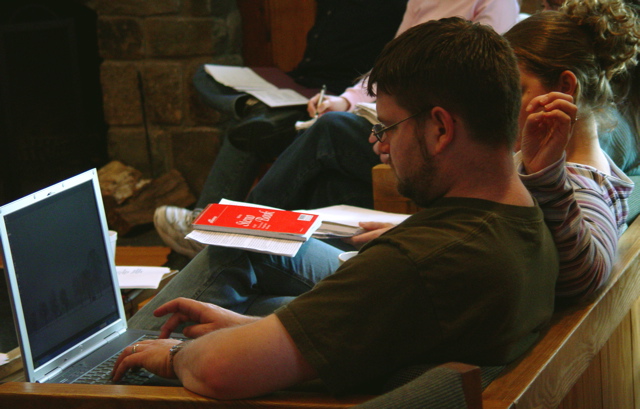Our summer fast from TV and electronic games taught us a lot about ourselves and community. We saw that this medium had a greater hold on us than we would like to admit, and that it could hinder our personal growth and relationships. The fast made us all aware of these things and universally we felt we needed to alter our lifestyle in some way. The difficulty was in trying to figure out what are the principles that should govern a policy we might create.
At first, we were tempted to have a “throw the stupid thing in the dump” reaction. Obviously, electronic entertainment was sapping a lot of life out of us, so why not just do away with it? That seemed like the righteous thing to do. But we could see some good that has come from the Tube: educational programs, dramatizations of classic literature, teachings, fun, and fellowship. Also, some of the fathers have had memorable times playing video games with their kids.

Our next thought centered on regulating content and usage. We know of other communities that have committees that approve movies and music for their community’s consumption, and they strictly regulate when these things can be enjoyed. This thought had some appeal because it would keep a unified standard in the community and would also act as a helpful control structure for those less disciplined. The downside was that we weren’t sure where to draw the line: why just movies? Perhaps we should think about regulating books, desserts, attire, etc.. We do have some general standards for these things already, but should we form a committee to regulate these more specifically? Why limit just electronic entertainment (that’s making you stay up late and exercising a negative influence) when reading a book can have the same effect? And besides, where is self-control in all this? Shouldn’t the Christian be actively developing his judgment and self-discipline?
Yet, it was the joint fast that really helped us. On our own, most of us probably wouldn’t have come to the insights we have now. The group dynamic really made a difference (kind of like exercising together with a friend or in a class…it strengthens your resolve). Plus, the atmosphere created in the community during the fast was noticeable. We wanted to retain that. None of us had an appetite to just go back to how it was.
Principles began to emerge as we discussed these things. External policies are good for creating corporate atmosphere or environment. Generally, that is their proper purview – regulating the common life among us. We want to model a different value system and priority in this world. We want our home to be a place of peace and spirituality, not noise and dissipation. In one word, we want to create “liminality.” Benedict Groeschel defines what I mean by this, “Liminality derives from the Latin limen (which means threshold or edge) and refers in this case to people who live beyond the accepted norms of the establishment.” We want to stand in contrast to a society that doesn’t recognize the way of the kingdom. So, whatever policy we come up with should somehow help us in this goal.
Secondly, the policy should help us get a vision for a more disciplined life and yet not dominate in such a way that one’s will is atrophied. In other words, if I never have to exercise self-control because the options for indulgence just don’t exist, I won’t grow. We want to cultivate interior righteousness, not lifeless, external righteousness. For the Christian, love is a “want to” not a “have to.” Our policy must aid us in our endeavor to mature as Christians.
We were able to craft such a policy and next post I’ll share what it is.